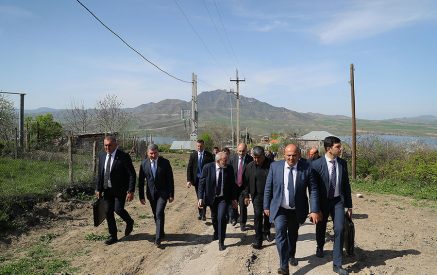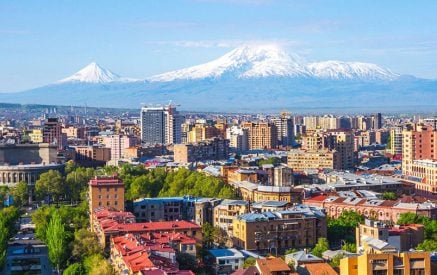If the World Bank Council fails
Recently, the World Bank published a report, which details the problems available in various branches of the economy of Armenia.
Studying Armenia’s financial market, the World Bank (WB) concluded, “The stock market in Armenia, as such, does not still operate.” From the perspective of stock exchange capitulation, our country is behind many countries in Europe and Central Asia: the capitulation of the stock exchange in Armenia makes only 1% of gross domestic product. And, although, in 2009, NASDAQ OMX Armenia jsc entered the Armenian market and implemented a number of technical improvements, however, the World Bank has noted that these reforms have not resulted in abrupt changes.
Read also
According to the report, “Due to underdevelopment of market mechanisms, as well as the lack of transparency in activities of the companies and “long money” managing institutional investors, the level of liquidity is low. The companies still have not acquired sufficient experience and knowledge of corporate governance, which would allow them to operate productively in the stock exchange. The family governance principles are still dominant in the corporate sector, under which it is impossible to effectively invest the diversification culture of the shares, as well as to separate the management from the ownership.”
Konstantin Saroyan, Chief Executive Officer of NASDAQ OMX Armenia jsc, also referred to the transparency of the companies functioning in Armenia as, so to say, an obstacle to the development of the stock exchange (ARKA news agency, 02.03.2012 ), which although assured that the year 2012 would be a turning point for the stock market, however, he had also noted that there are three factors that after solving them, the Armenian stock exchange will develop. One of these factors, according to Mr. Saroyan, is the fight against the shadow economy. “Coming out to the exchange platform and take the advantage of tax privileges, а question arises with the shadow business whether it can have savings by acting as a public and transparent company. Often, our businessmen are not interested in involving additional funds, because they simply do not know how to spend them.”
While our large businessmen working in the shadow would pass to noble and civilized economy and would try to enter the stock market, we should note that this year the government issued $ 700 million eurobonds, which by economists’ estimate could impact the stock market activation in Armenia.
Referring to Armenia’s banking system, the World Bank has stated that it is on a solid basis, is steadily developing, however, in terms of the size and innovation, it still lags behind most of European and Central Asian countries.
According to the World Bank report, in 2005-2012, the bank assets have grown by 6 times, on January 2013, there are 21 commercial banks and 1 development bank functioning in Armenia’s banking sector, which being the owner of more than 90% of the country’s financial assets, dominate in the financial market, and the share of credit institutions in the financial assets is very small.
As per World Bank estimates, our index on deposit involvement services of the banks of Armenia in the region is low. “After the 2009 crisis, the trust is reduced, the deposits were mainly in dollar, 10% of banks financing is generated through Armenian-German foundation, from the loans provided with affordable interests, and if the costs for the procurement of similar credit lines are not complied with long-term repayment rates, they can eventually push the loans with Armenian drams out of the market,” says the report. The WB has explained the high level of dollarization of bank savings by large-scale private remittances received from Diaspora, in part, by general distrust in national currency and by fearfulness of devaluation.
Pursuant to World Bank study results, macro, small and medium enterprises (MSMEs) have difficulties to access to loans. WB confirmed what local economists are always raising. The World Bank has explained the problem of MSMEs by mutual distrust.
For example, the banks have noted that MSMEs do not have required skills to be considered creditworthy. The banks think that financial management and marketing technologies and skills are missing in the mistrust companies. However, if we consider that micro business may have only, let’s say, up to 5 employees, and if we consider that the small shop or a small production unit, let’s say, is in a remote village, it is unlikely that the businessman is aware of marketing technologies, and for this very reason, in fact, they are deprived of the opportunity to expand their business.
For many companies, according to the World Bank, the loan terms are unfavorable: high interest rates and collateral requirements are the two factors that entrepreneurs have stated as the main barriers to the use of bank loans. The report also stated that many banks are reluctant to expand the scope of customers, and are satisfied with a small number of trusted clients. And, although there are development projects enhancing the financial capacities of MSMEs in Armenia, however, pursuant to the World Bank, they still have not shown significant results.
The majority of Armenia’s banks, according to the World Bank report, are small; even the largest bank equity capital does not exceed 100 million dollars. “Given the 20% loan limit of 1 creditor, the maximum loan provided by the largest bank in Armenia can not exceed $ 20 million. Therefore, the commercial banks are deprived of the opportunity to finance large investment projects.” According to experts, if the efficiency of the sector is increased, including the introduction of modern information and communication technologies, it is possible to reduce the bank interest rates by up to 1.5 %.
Nelly BABAYAN





















































